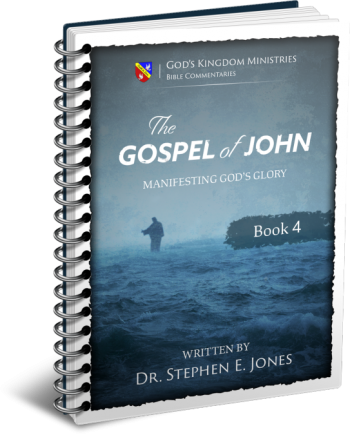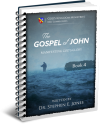Latest Posts
View the latest posts in an easy-to-read list format, with filtering options.

Jesus manifested God's glory through 8 miraculous signs in the gospel of John. These are a revelation of the feast of tabernacles.
Category - Bible Commentaries

Having completed His final teaching, Jesus then prayed for His somber disciples in John 17 just before crossing the Kidron ravine on the east side of the city (John 18:1). Perhaps they stood on the bridge that spanned the ravine and looked at the monuments and whitewashed sepulchers among olive trees clearly visible in the light of the full Passover moon.
There were three monuments that would have been visible to the disciples: the pillar of Absalom, the tomb of the sons of Hezir (a priestly family), and the tomb of Zechariah. The setting for Jesus’ prayer was ominous, as if they were soon to walk through the valley of the shadow of death (Psalm 23:4). But the prayer itself showed that both He and His anxious disciples did not need to fear, for they would be victorious in the end.
Before analyzing the prayer itself, we should note the structure of these first five verses, for they form a chiasm, a typical Hebrew parallelism, as follows:
A Glorification of the Son by the Father (17:1)
B Glorification of the Father by the Son (17:2)
C The Gift of Eternal Life (17:2)
C1 The Purpose of Eternal Life (17:3)
B1 Glorification of the Father by the Son (17:4)
A1 Glorification of the Son by the Father (17:5)
John 17:1-5 begins,
1 Jesus spoke these things; and lifting up His eyes to heaven, He said, “Father, the hour has come; glorify Your Son, that the Son may glorify You, 2 even as You gave Him authority over all flesh, that to all whom You have given Him, He may give eternal life. 3 This is eternal life, that they may know You, the only true God, and Jesus Christ, whom You have sent. 4 I have glorified You on the earth, having accomplished the work which You have given Me to do. 5 Now, Father, glorify Me together with Yourself, with the glory which I had with You before the world was.”
Jesus’ focus was not upon the negative things that were about to happen to Him but upon the positive things that would soon be accomplished. The path to glory would take Him through the valley of the shadow of death, but, like David, He looked beyond death to the time when “Surely goodness and mercy will follow me all the days of my life, and I will dwell in the house of the Lord forever” (Psalm 23:6).
Hence, it was not the hour of His death, but of His resurrection and ascension into glory. May we all see and understand this when we, like Him, see only tombs and monuments to the dead in the dim moonlight. When it seems as if God has abandoned us, may we remember His words of comfort, telling the disciples that He would not leave them as orphans but would comfort them with His presence through the Holy Spirit. The transition is not easy, and it may appear that we have been abandoned, alone and in the dark, but here is where faith is most needful. Hope is found only in believing His words of comfort which He gave beforehand and in believing the victorious outcome.
In John 17:1 Jesus addressed God as “Father” and continued to do so while in the context of His personal Father-Son relationship. As we will see later, He addressed God as “Holy Father” in the context of the disciples’ relationship with God (John 17:11). He addressed God as “Righteous Father” in the context of the world (John 17:25).
God is the Father of all, but this relationship is different with different people. Likewise, Jesus has been given “authority over all flesh” (John 17:2), yet only a few had been devoted to Him (John 10:28, 29). The eleven disciples were the original people who had been devoted according to the laws of devotion in Lev. 27:28, 29,
28 Nevertheless, anything which a man sets apart to the Lord out of all that he has, of man or animal or of the fields of his own property, shall not be sold or redeemed. Anything devoted to destruction is Most holy to the Lord. 29 No one who may have been set apart among men shall be ransomed; he shall surely be put to death.
In those days a man could “sell” his land inheritance (or a portion of it), but he also had the right of redemption. If he did not redeem the property, it always reverted back to him in the year of Jubilee. In other words, property sales were really only long-term leases. However, when a man devoted some property to God, his gift was permanent. No man could take it back later.
The law says that devoted things may include things that are “of man or animal or of the fields.” Jesus’ disciples provide us with an example of men who were devoted. So John 10:28, 29 says, quoting from The Emphatic Diaglott,
28 and I give them aionian life, and they shall by no means perish to the age, and no one shall wrest them out of My hand. 29 My Father, who has given them to Me, is greater than all; and no one is able to wrest them out of the Father’s hand.
The law of devotion in this case is applied not only to the disciples but also to those who were to be devoted later. They are the ones who will be given aionian life, or life in The Age. In other words, they are the overcomers who will inherit the First Resurrection, or, if alive at the end of the present age, will be changed from mortal to immortal without dying at all.
The law of devotion applies to people as well as to land or animals. The overcomers are examples of the devoted ones, and “no one is able to wrest them out of the Father’s hand.” God exercises His sovereign rights over the overcomers, taking personal responsibility for them.
The concept of devotion (cherem) can also imply destruction or death, as in the case of Jericho, the first city that was devoted to God. The NASB, however, translates the word as “under the ban” in Joshua 6:17, 18. This makes it difficult for many people to relate it to the law of devotion. While it is true that the city was destroyed, the main purpose of this “ban” was for God to lay claim to all the gold, silver, bronze, and iron in the city (Joshua 6:19). In other words, the people were “banned” from claiming it for themselves—on pain of death, as we see later in the case of Achan, who stole some of the devoted things.
When we apply this law by the New Covenant, we see that the overcomers are claimed by God for Himself. Once devoted, always devoted. This principle has been misinterpreted by those who do not know the law as once saved, always saved. However, this is not strictly true, for it is not strictly about salvation (i.e., justification) but about a specific application of salvation. Many are justified by faith through Passover without coming into agreement with God through the feast of Tabernacles. Devotion means that God has taken the responsibility to bring certain ones to the place of spiritual maturity so that they may enjoy immortality in The Age to come.
God is sovereign over all things, but He has not chosen everyone at the same time. He is the Savior of all, but not all at the same time. The whole idea behind being “chosen” is that God chooses the few now to bless the many later. Hence, He chose one man, Abraham, to be a blessing to all nations.
So the heart of the chiasm (C and C1) in John 17:1-5 is seen in the gift and purpose of aionian life. The main thrust of any Hebrew chiasm is found in the middle. Jesus Himself was about to be glorified, and His glory was to be shared with His disciples as well, who were examples of overcomers.
This glory, Jesus said in John 17:5, was “the glory which I had with You before the world was.” This establishes the fact that Christ pre-existed from the time before creation. He had divested Himself of that glory by coming to earth, but He was about to return to the Father and to that original state of glory.
Jesus was the greatest Overcomer, but not the only one. All of the overcomers were to share His glory, because they were also to share in His sufferings. The path to glory lay through the valley of the shadow of death. Hence, the law of devotion implies also a sentence of death. The law in Lev. 27:29 literally reads,
29 No one who may have been set apart among men shall be ransomed; he shall surely be put to death.
Such death applies in two ways. First, it is a death sentence upon anyone who lays claim to a devoted one, and this applies to those who have persecuted and killed the overcomers. But secondly, the overcomers themselves must share in Christ’s death (and resurrection), for Paul tells us in Rom. 6:7, “for he who died as been justified from sin” (The Emphatic Diaglott).
There is no resurrection without death. Neither is there justification apart from death. This does not mean that overcomers must of necessity be martyred, for John himself died a natural death. Many were indeed martyred, as were all of John’s fellow disciples, but justification does not depend upon the manner of one’s physical death. It is about crucifying the old man, as Paul tells us in Rom. 6:6.